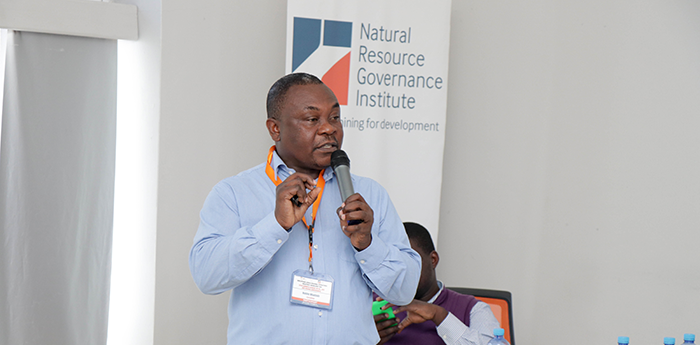
Building Consensus: A Ghana Civil Society Leader Describes Collaborative Efforts to Improve Petroleum Sector Management
Ghana, a new oil and gas producer, is determined to learn from past mistakes in mining by carefully managing its emerging petroleum sector. The government set up an independent statutory body known as the Public Interest and Accountability Committee (PIAC) in 2011 to promote transparent petroleum revenue management through a multi-stakeholder approach.
At the Anglophone Africa Regional Extractive Industries Knowledge Hub Course held in September in Accra, I sat down with Noble Wadzah. He represents civil society and community organizations at PIAC, and is learning what representing civil society interests in oil revenue management looks like in practice. Wadzah is also coordinator at Oilwatch Ghana, a grassroots civil society organization that works with local communities to oppose detrimental environmental and social effects of oil and gas activities.
Margarita Batlle: What has it been like to represent civil society interests on extractives issues?
 Noble Wadzah is a coordinator at Oilwatch Ghana and a civil society representative to Ghana’s Public Interest and Accountability Committee.
Noble Wadzah is a coordinator at Oilwatch Ghana and a civil society representative to Ghana’s Public Interest and Accountability Committee.
Noble Wadzah: It’s been an interesting experience to harmonize civil society into one bucket on oil and gas issues. I see PIAC as a way for civil society to continue supporting the government to deal with the challenges of the extractives sector.
As an active member of civil society, I know that we’ve collectively bemoaned the poor legacy left to us by our mining history. We thought, “It’s time to jump on the scene and not leave all decisions about oil and gas to the government.” It’s a great platform to unite and collectively solve issues.
We’ve made a lot of contributions to the petroleum revenue management law. About 70 percent of our recommendations were taken on board in that legislation. We’ve also made significant contributions to the petroleum exploration laws and the local content policy. Another key recommendation was to separate the Ghana National Petroleum Corporation from the Petroleum Commission.
What are the main challenges to your work right now in Ghana?
As a civil society organization, a lot of our work is about responding to local developments. Even if it wasn’t a part of our agenda before, it is now.
That can, at times, be very difficult. At times you have to find knowledge on an emerging issue [and] you don’t have expertise in that area. The other is the demands on our time and energies from different political actors.
Sometimes politicians are obstinate. They stick to their views and politicize the issues. You have to find a common ground. This can be terribly difficult at times. Sometimes political actors deliberately frustrate your efforts. During a one-on-one, they tell you it’s a good idea. But when it comes time to publicly express their support, they make things difficult, even though they know all about the issue. We often talk about building capacity for politicians, but at times they even know more than us!
Initially we used to have mistrust between politicians and civil society. But this is slowly improving. We are working together now. The Extractive Industries Transparency Initiative offers a very good approach for stakeholders to hold dialogue and work toward collaborative relationships.
How do you think a course like this might help in your day-to-day work?
With contract negotiation, I now know exactly which steps we should take. So when there is a contract in front of me now, I will be able to appraise it using the tools I’ve learnt here. Same with the issues of environmental governance, which in my organization has been one of our biggest cries. The course has also taught me what other countries are doing with respect to public interest mitigation. This is an issue we have been working on, but we have not [had the same] success as others. This course tells me that it is possible.
How do you feel after spending two weeks with people you had never met before?
It’s been exciting to connect with people from different parts of the continent. Some have been students and colleagues, while others have been teachers and mentors. What I’ve seen with the students is that we have knowledge, but it is scattered. The course has made it possible for us to put it into context and focus and form the complete picture.
This interview has been edited for clarity and length.
Margarita Batlle is a capacity development officer at the Natural Resource Governance Institute (NRGI).
